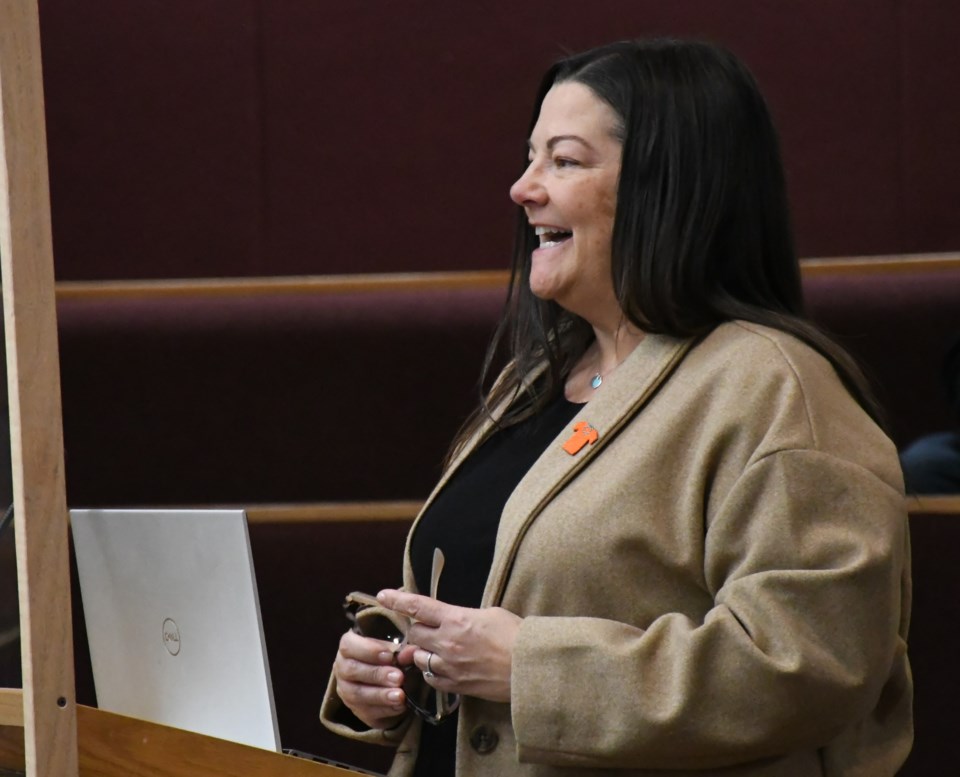MOOSEJAWTODAY.COM — Moose Jaw is a city filled with history and heritage, so to better communicate those stories, the municipality is participating in a pilot project run by a local tech company.
Jessica McNaughton, CEO and co-founder of that helps individuals, businesses and communities save, store, protect and tell their stories through pictures, videos and audio — a digital time capsule, if you will — gave a presentation about her company’s services during the recent city council meeting.
The Moose Jaw-owned business won an MJBEX innovation award two years ago and won a people’s choice award through Startup Global Canada last year.
The company is teaming with the heritage advisory committee, which has been working to update and install heritage plaques throughout the city. These plaques will include QR codes — a project 15 years in the making — that, when scanned, provide information about the building or property.
City hall has gathered information about 66 sites that are either designated or non-designated heritage locations, while 20 locations currently have plaques and would be ready for a QR code.
“This is a really exciting opportunity to participate in a pilot project that we are doing for (Saskatchewan Urban Municipalities Association) members exclusively and supported by Innovation Saskatchewan,” McNaughton said.
“The intent of the pilot is to help communities bring together content and grow economic development through storytelling.”
The pilot project starts Tuesday, April 30 and runs until Saturday, Nov. 30, and includes a one-year, subsidized subscription of $544, with a second year costing the same; a normal one-year cost is $1,200. Furthermore, the business will provide the heritage committee and city hall with six training sessions about connecting with audiences.
This “incredible storytelling training” will happen with expert storytellers, she continued, such as Doug Griffiths, who wrote “13 Ways to Kill Your Community;” Andrew Hiltz, the current Saskatchewanderer; a former Saskatchewanderer, who will talk about shining a light on hidden gems; and a businessman who operates a TV show about connecting global communities.
Moose Jaw will participate with 50 other Saskatchewan communities, allowing each to learn from and collaborate with others, and will also receive direct customer service.
While memoryKPR’s No. 1 goal is storytelling, where the program really shines is in the collection of stories, she said. For example, while a QR code can tell the story of a building, residents and tourists can also contribute their experiences about that structure or location.
The business has worked with Dakota Dunes Casino, the Canadian Football League for the 2022 Grey Cup in Regina, the Saskatchewan Roughriders and Regina Eco Museums, the latter a museum without walls where QR codes are attached to exhibits throughout the community.
“It’s very easy to put together,” said McNaughton.
This technology is safe because memoryKPR works with one of the best global providers to protect information, while it only captures “agnostic data” from people who view or contribute to stories, she continued.
“We protect not only the story keepers but the people interacting with the stories,” McNaughton said, adding the company can also tell how many people have scanned a QR code and can embed an app on the city website so people can view videos.
memoryKPR has been working with a community in British Columbia to promote its content and stories digitally, a task the jurisdiction has been pursuing for five years, said McNaughton. Once the Prairie business came on board, the community built its stories within a week and was ready to connect them to QR codes because it finally had a suitable platform.
“At first, they thought we were the solution as a stopgap until they had built all the technology themselves, but after they did it, they (said) there’s no way they’re doing it themselves,” she chuckled.
The next regular council meeting is Monday, May 13.




